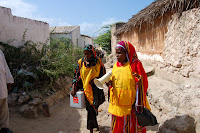
Dozens of developing countries have suffered outbreaks of polio, the highly infectious viral disease. Polio and other diseases are major contributors to poverty. Polio victims struggle to create livelihoods for themselves and some struggle to even cope with day to day activities. Since polio cases are extremely rare in the United States, a large number of American citizens still do not know what exactly causes polio.
The World Health Organization’s (WHO) definition of polio is: Poliomyelitis (polio) is a highly infectious viral disease, which mainly affects young children. The virus is transmitted through contaminated food and water, and multiplies in the intestine, from where it can invade the nervous system. Many infected people have no symptoms, but do excrete the virus in their feces, hence transmitting infection to others. Polio can only be prevented by immunization.
One success story of polio eradication has happened in Somalia of all places. Somalia is celebrating three years of being polio-free since March 25, 2007. This is a historic achievement in public health because it happened in a politically unstable setting where conflict is rampant and there is little to no infrastructure. This amazing feat was made possible by tens of thousands Somali volunteers and health workers. These people risked their lives to get vaccines to more than 1.8 million children under five by going house to house in villages and settlements across the country.
- Clare O.
SOURCE: World Health Organization



